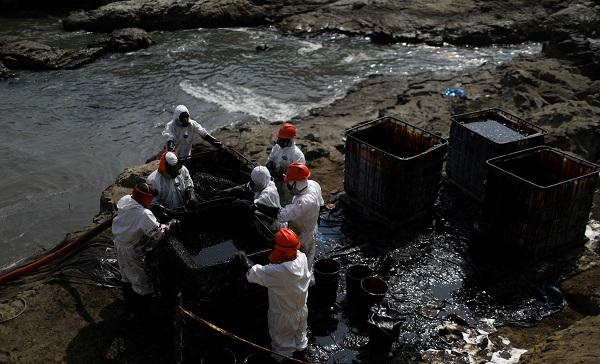After experiencing the fears of volcanic eruptions and tsunamis, Tongans are now more worried about the "coronavirus tsunami".
The revelation that an Australian warship carrying relief supplies was infected with more than two dozen crew members of the coronavirus has raised renewed concerns about the safety of Tonga – the South Pacific island nation that is one of the few "pure lands" in the world that has not yet been hit by the COVID-19 pandemic.
This is the third time that the new crown virus is approaching Tonga after the volcanic eruption.

The waves from the eruption of a volcano in Tonga caused a spill of oil from a vessel, polluting the beach and cleaning up the beach. Oriental IC
An unprecedented disaster
The violent eruptions of undersea volcanoes and the ensuing tsunami brought unprecedented disasters to Tonga.
"It turns out that cleaning up the ash is much more difficult than expected." UNICEF's Pacific Islands Resident Coordinator, Vichy, said that while water pressure could be used to clear the ash from the airport's runway faster, the ship carrying the equipment was still on the road and would take at least a week or so to arrive.
"We also heard that the food in the store was sold out." On some of Tonga's islands, drinking water and food supplies are scarce, Vecchi said.
Although the Red Cross has about 70 volunteers in Tonga and can provide tarpaulins, kits and blankets for building shelters to some 1,200 families, it is difficult to say whether this is enough.
What is most lacking at the moment is drinking water. Locals rely mainly on groundwater, volcanic eruptions pollute water sources, and tsunamis cause waves to flood the water. Cronin, a volcanologist at the University of Auckland, said that the ash is mixed with mineral salts containing sulfur, chlorine and fluorine, and water will dissolve mineral salts and produce acid, not only will the water change its taste, but also cause stomach problems when the concentration is higher.
Pictured: On January 24, the Japan Air Self-Defense Forces prepare to deliver supplies to Tonga. Oriental IC
Keep the virus out
But even so difficult, Tonga remained cautious in the face of relief supplies from all sides.
An Australian transport plane was turned away from Tonga because a crew member contracted the coronavirus and had to turn back on the way to deliver relief supplies. Four of the Japanese rescue team members who delivered drinking water to Tonga tested positive for COVID-19, resulting in 36 close contacts being quarantined and aid missions having to be halted. Even if there is no rescue ship with an outbreak, the crew will not go ashore, and the supplies will be delivered to the island by crane.
Now, 23 of the more than 600 crew members on the Australian warship Adelaide, which carries relief supplies and medical equipment, are infected with the new crown virus.
Given that the runway of the airport has not been cleared, the ability of aircraft to transport is limited, and there is an urgent need for replenishment, Tonga made an exception to allow the Adelaide to stop. However, the premise is that the materials are handed over in a contactless manner, and the materials are first subjected to 3 days of standing "isolation".
Pictured: Tongatapu Island coastline. Infographic
The lessons of history are too painful
So cautious because in the face of tsunamis and viruses, The Tongans are more worried about the latter.
Since the outbreak of COVID-19, Tonga has been in a state of near isolation. All inbound commercial flights are suspended and only Tongan citizens, permanent residents and some persons approved by the Tonga Ministry of Health can enter Tonga on a small number of charter flights. All arrivals in Tonga must undergo a three-week quarantine.
Tonga also has strict curfews and gathering restrictions, and 61% of the population has been vaccinated with two doses of COVID-19. To date, only one confirmed case has been reported in Tonga, a woman who has flown home from New Zealand.
It can be said that this is a rare "pure land" in the world under the new crown epidemic. But no one can be sure that Tonga is ready to face the coronavirus head-on.
Tonga has a painful historical memory of foreign diseases.
The ocean has always been Tonga's natural barrier against foreign diseases and wars, but by the 18th century, European colonists had "sent" measles, smallpox, dysentery, plague, and influenza. The measles virus, which was endemic in the South Pacific island nation in the early 19th century alone, killed almost a quarter of the population.
"All the diseases brought by the West have had a terrible impact on a country like Tonga." Preke, director of the Pacific Islands Program at the Lowy Institute, a think tank, commented on this.
Tonga is also trying its best to keep the coronavirus out of the door, after all, the battered island nation does not have the energy to endure another "new crown tsunami".
Xinmin Evening News reporter Qi Xu